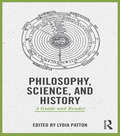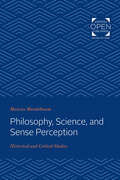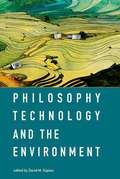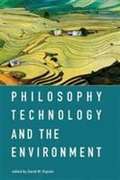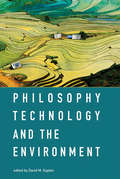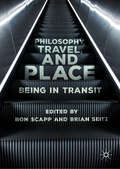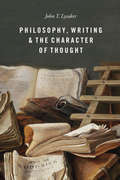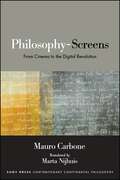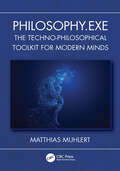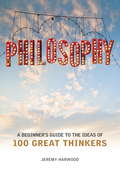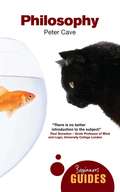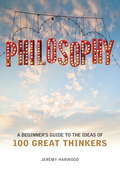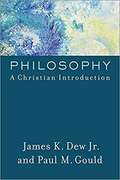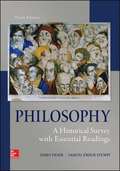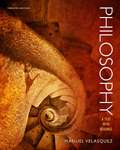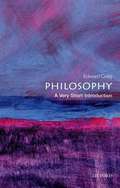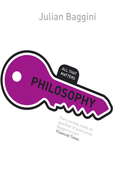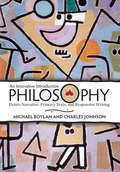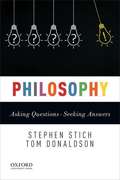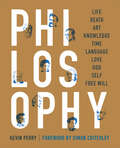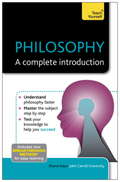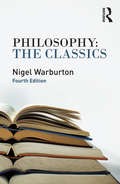- Table View
- List View
Philosophy, Science, and History: A Guide and Reader
by Lydia PattonPhilosophy, Science, and History: A Guide and Reader is a compact overview of the history and philosophy of science that aims to introduce students to the groundwork of the field, and to stimulate innovative research. The general introduction focuses on scientific theory change, assessment, discovery, and pursuit. Part I of the Reader begins with classic texts in the history of logical empiricism, including Reichenbach’s discovery-justification distinction. With careful reference to Kuhn’s analysis of scientific revolutions, the section provides key texts analyzing the relationship of HOPOS to the history of science, including texts by Santayana, Rudwick, and Shapin and Schaffer. Part II provides texts illuminating central debates in the history of science and its philosophy. These include the history of natural philosophy (Descartes, Newton, Leibniz, Kant, Hume, and du Châtelet in a new translation); induction and the logic of discovery (including the Mill-Whewell debate, Duhem, and Hanson); and catastrophism versus uniformitarianism in natural history (Playfair on Hutton and Lyell; de Buffon, Cuvier, and Darwin). The editor’s introductions to each section provide a broader perspective informed by contemporary research in each area, including related topics. Each introduction furnishes proposals, including thematic bibliographies, for innovative research questions and projects in the classroom and in the field.
Philosophy, Science, and Sense Perception: Historical and Critical Studies
by Maurice MandelbaumOriginally published in 1964. In four essays, Professor Mandelbaum challenges some of the most common assumptions of contemporary epistemology. Through historical analyses and critical argument, he attempts to show that one cannot successfully sever the connections between philosophic and scientific accounts of sense perception. While each essay is independent of the others, and the argument of each must therefore be judged on its own merits, one theme is common to all: that critical realism, as Mandelbaum calls it, is a viable epistemological position, even though some schools of thought hold it in low esteem.
Philosophy, Technology, and the Environment
by David M. KaplanEnvironmental philosophy and philosophy of technology have taken divergent paths despite their common interest in examining human modification of the natural world. Yet philosophers from each field have a lot to contribute to the other. Environmental issues inevitably involve technologies, and technologies inevitably have environmental impacts. In this book, prominent scholars from both fields illuminate the intersections of environmental philosophy and philosophy of technology, offering the beginnings of a rich new hybrid discourse. All the contributors share the intuition that technology and the environment overlap in ways that are relevant in both philosophical and practical terms. They consider such issues as the limits of technological interventions in the natural world, whether a concern for the environment can be designed into things, how consumerism relates us to artifacts and environments, and how food and animal agriculture raise questions about both culture and nature. They discuss, among other topics, the pessimism and dystopianism shared by environmentalists, environmental philosophers, and philosophers of technology; the ethics of geoengineering and climate change; the biological analogy at the heart of industrial ecology; green products and sustainable design; and agriculture as a bridge between technology and the environment.ContributorsBraden Allenby, Raymond Anthony, Philip Brey, J. Baird Callicott, Brett Clark, Wyatt Galusky, Ryan Gunderson, Benjamin Hale, Clare Heyward,Don Idhe, Mark Sagoff, Julian Savulescu, Paul B. Thompson, Ibo van de Poel, Zhang Wei,Kyle Powys Whyte
Philosophy, Technology, and the Environment
by David M. KaplanEnvironmental philosophy and philosophy of technology have taken divergent paths despite their common interest in examining human modification of the natural world. Yet philosophers from each field have a lot to contribute to the other. Environmental issues inevitably involve technologies, and technologies inevitably have environmental impacts. In this book, prominent scholars from both fields illuminate the intersections of environmental philosophy and philosophy of technology, offering the beginnings of a rich new hybrid discourse. All the contributors share the intuition that technology and the environment overlap in ways that are relevant in both philosophical and practical terms. They consider such issues as the limits of technological interventions in the natural world, whether a concern for the environment can be designed into things, how consumerism relates us to artifacts and environments, and how food and animal agriculture raise questions about both culture and nature. They discuss, among other topics, the pessimism and dystopianism shared by environmentalists, environmental philosophers, and philosophers of technology; the ethics of geoengineering and climate change; the biological analogy at the heart of industrial ecology; green products and sustainable design; and agriculture as a bridge between technology and the environment.ContributorsBraden Allenby, Raymond Anthony, Philip Brey, J. Baird Callicott, Brett Clark, Wyatt Galusky, Ryan Gunderson, Benjamin Hale, Clare Heyward,Don Idhe, Mark Sagoff, Julian Savulescu, Paul B. Thompson, Ibo van de Poel, Zhang Wei,Kyle Powys Whyte
Philosophy, Technology, and the Environment (The\mit Press Ser.)
by David KaplanContributions by prominent scholars examining the intersections of environmental philosophy and philosophy of technology.Environmental philosophy and philosophy of technology have taken divergent paths despite their common interest in examining human modification of the natural world. Yet philosophers from each field have a lot to contribute to the other. Environmental issues inevitably involve technologies, and technologies inevitably have environmental impacts. In this book, prominent scholars from both fields illuminate the intersections of environmental philosophy and philosophy of technology, offering the beginnings of a rich new hybrid discourse. All the contributors share the intuition that technology and the environment overlap in ways that are relevant in both philosophical and practical terms. They consider such issues as the limits of technological interventions in the natural world, whether a concern for the environment can be designed into things, how consumerism relates us to artifacts and environments, and how food and animal agriculture raise questions about both culture and nature. They discuss, among other topics, the pessimism and dystopianism shared by environmentalists, environmental philosophers, and philosophers of technology; the ethics of geoengineering and climate change; the biological analogy at the heart of industrial ecology; green products and sustainable design; and agriculture as a bridge between technology and the environment.ContributorsBraden Allenby, Raymond Anthony, Philip Brey, J. Baird Callicott, Brett Clark, Wyatt Galusky, Ryan Gunderson, Benjamin Hale, Clare Heyward, Don Idhe, Mark Sagoff, Julian Savulescu, Paul B. Thompson, Ibo van de Poel, Zhang Wei, Kyle Powys Whyte
Philosophy, Travel, and Place: Being In Transit
by Brian Seitz Ron ScappThis book continues the exploration of themes either neglected or devalued by others working in the field of philosophy and culture. The authors in this volume consider the domain of travel from the broadest and most diverse of philosophical perspectives, covering everyday topics ranging from commuting and vacation travel to immigration and forced relocation. Our time in transit, our being in transit, and our time at rest, whether by choice or edict, has always been at issue, always been at play (and has always been in motion, if you will), for our species. The essays collected here explore the possibilities of the material impact of being able to move or stay put, as well as being forced to go or prevented from leaving.
Philosophy, Writing, & the Character of Thought
by John T. LysakerLysaker examines the relationship between philosophical thought and the act of writing to explore how this dynamic shapes the field of philosophy. Philosophy’s relation to the act of writing is John T. Lysaker’s main concern in Philosophy, Writing, and the Character of Thought. Whether in Plato, Montaigne, Nietzsche, Wittgenstein, or Derrida, philosophy has come in many forms, and those forms—the concrete shape philosophizing takes in writing—matter. Much more than mere adornment, the style in which a given philosopher writes is often of crucial importance to the point he or she is making, part and parcel of the philosophy itself. Considering how writing influences philosophy, Lysaker explores genres like aphorism, dialogue, and essay, as well as logical-rhetorical operations like the example, irony, and quotation. At the same time, he shows us the effects of these rhetorical devices through his own literary experimentation. In dialogue with such authors as Benjamin, Cavell, Emerson, and Lukács, he aims to revitalize philosophical writing, arguing that philosophy cannot fulfill its intellectual and cultural promise if it keeps to professional articles and academic prose. Instead, philosophy must embrace writing as an essential, creative activity, and deliberately reform how it approaches its subject matter, readership, and the evolving social practices of reading and reflection.
Philosophy-Screens: From Cinema to the Digital Revolution (SUNY series in Contemporary Continental Philosophy)
by Mauro CarboneIn The Flesh of Images, Mauro Carbone analyzed Merleau-Ponty's interest in film and modern painting as it relates to his aesthetic theory and as it illuminates our contemporary relationship to images. Philosophy-Screens broadens the work undertaken in this earlier book, looking at the ideas of other twentieth-century thinkers concerning the relationship between philosophy and film, and extending that analysis to address our experience of electronic and digital screens in the twenty-first century. In the first part of the book, Carbone examines the ways that Sartre, Merleau-Ponty, Lyotard, and Deleuze grappled with the philosophical significance of cinema as a novel aesthetic medium unfolding in the twentieth century. He then considers the significance of this philosophical framework for understanding the digital revolution, in particular the extent to which we are increasingly and comprehensively connected with screens. Smartphones, tablets, and computers have become a primary referential optical apparatus for everyday life in ways that influence the experience not only of seeing but also of thinking and desiring. Carbone's Philosophy-Screens follows Deleuze's call for "a philosophy-cinema" that can account for these fundamental changes in perception and aesthetic production, and adapts it to twenty-first-century concerns.
Philosophy.exe: The Techno-Philosophical Toolkit for Modern Minds (Security, Audit and Leadership Series)
by Matthias MuhlertWe live in an age of unprecedented complexity, where technology, cognitive biases, and societal systems shape our decisions in ways we barely notice. The world is changing faster than our ability to make sense of it. Philosophy.exe is designed to bridge this gap, offering a mental toolkit to help navigate uncertainty, rethink assumptions, and make better decisions in a tech-driven world.Blending classical philosophy, cognitive science, AI ethics, and behavioral psychology, this book provides an adaptive framework for understanding the world. It challenges over-simplified models and rigid ideologies, encouraging readers to embrace complexity as a strategic advantage rather than a threat.What This Book Explores· Complexity Thinking – Why linear logic fails and how to develop a mindset that thrives in uncertainty.· Cognitive Biases & Decision-Making – How hidden mental shortcuts shape our beliefs, and how to counteract them.· Resilience & Mental Adaptability – Tools for maintaining clarity, focus, and critical thinking in a rapidly evolving landscape.· Technology & Human Autonomy – The philosophical and ethical challenges of AI, digital identity, and algorithmic decision-making.· Ethics Beyond Intentions – A pragmatic approach to decision-making that accounts for unintended consequences.Philosophy.exe is for those who seek to go beyond conventional wisdom—whether philosophers, strategists, leaders, or curious minds who question the narratives shaping modern life. It provides the tools to think deeply, adapt quickly, and engage critically in an era dominated by complexity and rapid technological evolution.In a world of misinformation, automation, and uncertainty, this book isn’t just about philosophy—it’s about survival.
Philosophy: A Beginner's Guide
by Jeremy HarwoodFrom philosophy's founding fathers - Thales, Socrates, Plato... to great minds of the post-modern era - Satre, Ayer, Feyerabend... this concise new guide presents 100 of the world's most influential thinkers. Arranged from the ancient world to the present day, each philosopher's key ideas, notable works and pronouncements are encapsulated in a series of succinct biographies, accompanied by illustrations, at-a-glance fact panels and thought-provoking quotations. Philosophy: A Beginner's Guide uncovers the fundamental concepts of this fascinating discipline, explaining the diverging schools of thought and revealing the universal aim of philosophy throughout the ages - to push back the boundaries of human knowledge in order to understand the fundamental nature of human existence. THE ANCIENT WORLD: Thales (c.635-c.543 BCE); Buddha (c.563-483 BCE); Confucius (c.55-479 BCE); Socrates (470-399 BCE); Plato (427-347 BCE); Aristotle (384-322 BCE). THE MIDDLE AGES: Avicenna (Ibn Sina) (980-1037); Peter Lombard (c1100-1160); Averroes (Ibn Rushd) 1126-1198); Thomas Aquinas (1225-1274); William of Ockham (1285- 1349). THE EARLY MODERN ERA: Machiavelli (1469-1527); Hobbes (1588-1679); Descartes (1596-1650); Locke (1632-1704); Voltaire (1694-1778). THE MODERN ERA: Fichte (1762-1814); G W F Hegel (1770-1831); Schopenhauer (1788-1860); Marx (1818-1883); Engels (1820-1895); Nietzsche (1844-1900); Dewy (1859-1952); Max Weber (1864-1920); Gasset (1883-1955); Heidegger (1889-1976). THE POST-MODERN ERA: Marcuse (1898-1979); Karl Popper (1902-1994); Sartre (1905-1980); Arendt (1906-1975); de Beauvoir (1908-1986); A J Ayer (1910-1989); Feyerabend (1924-1994); Rorty (1931-2007). And many more...
Philosophy: A Beginner's Guide
by Jeremy HarwoodFrom philosophy's founding fathers - Thales, Socrates, Plato... to great minds of the post-modern era - Satre, Ayer, Feyerabend... this concise new guide presents 100 of the world's most influential thinkers. Arranged from the ancient world to the present day, each philosopher's key ideas, notable works and pronouncements are encapsulated in a series of succinct biographies, accompanied by illustrations, at-a-glance fact panels and thought-provoking quotations. Philosophy: A Beginner's Guide uncovers the fundamental concepts of this fascinating discipline, explaining the diverging schools of thought and revealing the universal aim of philosophy throughout the ages - to push back the boundaries of human knowledge in order to understand the fundamental nature of human existence. THE ANCIENT WORLD: Thales (c.635-c.543 BCE); Buddha (c.563-483 BCE); Confucius (c.55-479 BCE); Socrates (470-399 BCE); Plato (427-347 BCE); Aristotle (384-322 BCE). THE MIDDLE AGES: Avicenna (Ibn Sina) (980-1037); Peter Lombard (c1100-1160); Averroes (Ibn Rushd) 1126-1198); Thomas Aquinas (1225-1274); William of Ockham (1285- 1349). THE EARLY MODERN ERA: Machiavelli (1469-1527); Hobbes (1588-1679); Descartes (1596-1650); Locke (1632-1704); Voltaire (1694-1778). THE MODERN ERA: Fichte (1762-1814); G W F Hegel (1770-1831); Schopenhauer (1788-1860); Marx (1818-1883); Engels (1820-1895); Nietzsche (1844-1900); Dewy (1859-1952); Max Weber (1864-1920); Gasset (1883-1955); Heidegger (1889-1976). THE POST-MODERN ERA: Marcuse (1898-1979); Karl Popper (1902-1994); Sartre (1905-1980); Arendt (1906-1975); de Beauvoir (1908-1986); A J Ayer (1910-1989); Feyerabend (1924-1994); Rorty (1931-2007). And many more...
Philosophy: A Beginner's Guide (Beginner's Guides)
by Peter CavePhilosophy, the "love of wisdom", is the product of our endless fascination and curiosity about the world - the child of wonder. Through it, we seek to answer the most fundamental of questions: How do we know what we know? Does God exist? What is beauty? How should we live our lives? Who am I?In this exhilarating tour, Peter Cave navigates all the main topics in the subject with verve and clarity, from political philosophy to existentialism. Using witty and whimsical examples, including stoical sofas and Reg, the "regular" human, who just happens to carry his brain in a rucksack, Cave provides a welcome antidote to the dry textbook and underscores philosophy's enduring relevance today. Interspersed with helpful textboxes and mini biographies of the key thinkers, there is no better introduction for the aspiring sage.
Philosophy: A Beginner's Guide to the Ideas of 100 Great Thinkers
by Jeremy HarwoodFrom philosophy's founding fathers like Thales, Socrates, and Plato to great minds of the post-modern era like Sartre, Ayer, and Feyerabend, this essential guide distills the thoughts of the world's most influential minds and explains their answers to some of philosophy's key questions. Is there a Supreme Being? Who am I? What is truth? Do we have free will? Why do bad things happen? How should we live? Is death the end of everything? What is the meaning of life?Arranged from the ancient world to the present day, each philosopher's key ideas, notable works and pronouncements are encapsulated in a series of succinct , easy-to-read biographies, accompanied by illustrations, at-a-glance fact panels and thought-provoking quotations, making this the ideal beginner's guide for those wanting to get to grips with this fascinating but often daunting subject.
Philosophy: A Christian Introduction
by Paul M. Gould James K. Jr DewTwo experienced educators offer an up-to-date introduction to philosophy from a Christian perspective that covers the four major areas of philosophical thought: epistemology, metaphysics, philosophy of religion, and ethics. <p><p> Written from an analytic perspective, the book introduces key concepts and issues within the main areas of philosophical inquiry in a comprehensive yet accessible way, inviting readers on a quest for goodness, truth, and beauty that ultimately points to Jesus as the source of all.
Philosophy: A History Survey with Essential Readings (Ninth Edition)
by James Fieser Samuel Enoch StumpfThis text brings together Stumpf and Fieser's Socrates to Sartre and Beyond with an updated anthology of readings in one volume. It offers an accessible historical survey of philosophical ideas and a wealth of primary source readings at an excellent value. The text is a comprehensive, historically organized introduction to philosophy which communicates the richness of the discipline and provides the student with a working knowledge of the development of Western philosophy. With a lively and approachable style it covers the principal contributions of Western civilization's most influential philosophers. The chronologically organized reader features a wide selection of readings of both Western philosophy and Eastern philosophy.
Philosophy: A Text With Readings (Twelfth Edition)
by Manuel VelasquezEngaging and compelling on every page, Velasquez's text helps you explore and understand philosophy while it helps you appreciate the relevance of philosophy to your day-to-day life and the larger social world. This trusted text combines clear prose and primary source readings to take you on a meaningful exploration of a range of philosophical topics, such as human nature, reality, truth, ethics, the meaning of life, diversity, and social/political philosophy. Carefully crafted built-in learning aids help you quickly master the material and succeed in your course.
Philosophy: A Very Short Introduction
by Edward CraigHow ought we to live? What really exists? How do we know? This book introduces important themes in ethics, knowledge, and the self, via readings from Plato, Hume, Descartes, Hegel, Darwin, and Buddhist writers. It emphasizes throughout the point of doing philosophy, explains how different areas of philosophy are related, and explores the contexts in which philosophy was and is done.
Philosophy: All That Matters
by Julian BagginiIn this book:'Philosophy is like fish: best presented without too much adornment; hard to get just right and easy to ruin.'What's the point of it all? In Philosophy: All That Matters, bestselling philosopher Julian Baggini shows how abstract ideas feed into the most important existential questions of all. He tells the story of Philosophy, bringing together and interlinking all its different areas, to create what is perhaps the first non-historical narrative of the subject -- one that takes you right to its heart. It places philosophy firmly at the centre of what makes us human. From ethics and metaphysics, to the philosophy of science and religion, Baggini explains what makes us different to other species, why philosophy lies at the heart of that difference, and why that matters.This accessible and readable book will appeal to both students and general readers, giving a fascinating taste of philosophy -- and what matters most within it.The All That Matters series:All That Matters books:All books in the All That Matters series are written by world experts in their subject field. These experts work to distil a topic and get right to its heart, making the book accessible for both students and general readers. Each compelling book contains new and interesting perspectives and tells stories that matter.The Author:'one of our most lucid and accessible popularisers of philosophy'Julian Baggini is a philosopher, author and journalist, who was recently named on the Observer's list of Britain's top public intellectuals. His doctorate was from University College London on the philosophy of personal identity, and his books have been published globally and translated into twelve languages. Baggini is widely regarded as one of our most lucid and accessible popularisers of philosophy. His work appears regularly in the Guardian, Prospect and the New Humanist, and he founder The Philosophers Magazine. Julian has also appeared as a character in an Alexander McCall Smith novel, and been the subject of a question in University Challenge. Keep up with Julian Baggini on his website or follow his Twitter account @microphilosophy.Other books in the All That Matters series:All That Matters - Interesting introductions to important issuesBooks on the following subjects are available from the All That Matters series: Muhammad, Water, Political Philosophy, Sustainability, God, Intelligence, Love, Russian Revolution, War, and Creativity.Philosophy - understand philosophy - story of philosophy - existential questions - abstract - the human mind - moral philosophy - ethics - metaphysics - science - religion - accessible - pocket sized - All That Matters - world expert - students - general interest - an introduction to philosophy - ideas - e-book - what is philosophy - knowledge - Plato - Hegel - Descartes
Philosophy: An Innovative Introduction (Studies In Social, Political, And Legal Philosophy #70)
by Michael BoylanPhilosophy: An Innovative Introduction features a unique, engaging approach to introduce students to philosophy. It combines traditional readings and exercises with fictive narratives starring central figures in the history of the field from Plato to Martin Luther King, Jr. The book makes innovative use of compelling short stories from two writers who have prominently combined philosophy and fiction in their work. These narratives illuminate pivotal aspects of the carefully selected classic readings that follow. This gives students two ways to understand the philosophical positions: through indirect argument in fiction and through direct, deductive presentations. Study questions and writing exercises accompany each set of readings and help students grasp the material and create their own arguments.
Philosophy: Asking Questions--Seeking Answers
by Stephen Stich; Tom Donaldsonit focuses on the key issues in Western philosophy, presenting balanced coverage of each issue and challenging students to make up their own minds. Each chapter incorporates discussion questions, key terms, a glossary, and suggestions for further readings to help make the material more understandable to novices.
Philosophy: Bullet Guides
by Robert AndersonOpen this book and you will Discover the theory of knowledge Meet key thinkers Analyse the main arguments Explore the history of philosophy
Philosophy: Philosophy (Minnesota Studies In The Philosophy Of Science #21)
by Robert AndersonOpen this book and you will Discover the theory of knowledge Meet key thinkers Analyse the main arguments Explore the history of philosophy
Philosophy: Philosophy In The Poetry Of Wallace Stevens
by Kevin PerryPhilosophy is to question everything. More than a lifestyle, larger than any single idea, broader than a conviction, philosophy is the love of exploration, of knowledge, of uncertainty, and of that cornerstone of free thinking: doubt. Kevin Perry's "Philosophy" takes the reader on a grand tour of life's biggest questions, examining all that the world's greatest philosophers have said about life and death, love and loss, language, art and God, to name a few. Philosophy is a great companion and a roadmap to navigate life's major milestones, including: How to make sense of death What loving someone or something means The effect of art on our lives What role language plays in understanding the world How do our ideas affect our actions
Philosophy: Teach Yourself
by Sharon KayeWritten by Sharon Kaye, who is Professor of Philosophy at John Carroll University, Philosophy: A Complete Introduction is designed to give you everything you need to succeed, all in one place. It covers the key areas that students are expected to be confident in, outlining the basics in clear jargon-free English, and then providing added-value features like summaries of key books, and even lists of questions you might be asked in your seminar or exam.The book uses a structure that mirrors many university courses on philosophy - using the work of key philosophers to springboard into a discussion of all the main areas of philosophy.Teach Yourself titles employ the 'Breakthrough method', which is designed specifically to overcome problems that students face.- Problem: "I find it difficult to remember what I've read."; Solution: this book includes end-of-chapter questions and summaries, and flashcards of key points available on-line and as apps- Problem: "Most books mention important other sources, but I can never find them in time."; Solution: this book includes key texts and case studies are summarised, complete with fully referenced quotes ready to use in your essay or exam.- Problem: "Lots of introductory books turn out to cover totally different topics than my course."; Solution: this book is written by a current university lecturer who understands what students are expected to know.
Philosophy: The Classics
by Nigel WarburtonNow in its fourth edition, Philosophy: The Classics is a brisk and invigorating tour through the great books of western philosophy. In his exemplary clear style, Nigel Warburton introduces and assesses thirty-two philosophical classics from Plato’s Republic to Rawls’ A Theory of Justice. The fourth edition includes new material on: Montaigne Essays Thomas Paine Rights of Man R.G. Collingwood The Principles of Art Karl Popper The Open Society and Its Enemies Thomas Kuhn The Structure of Scientific Revolutions With a glossary and suggestions for further reading at the end of each chapter, this is an ideal starting point for anyone interested in philosophy.
